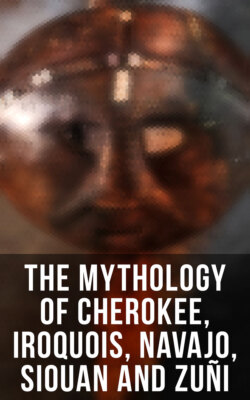Читать книгу The Mythology of Cherokee, Iroquois, Navajo, Siouan and Zuñi - James Mooney - Страница 112
На сайте Литреса книга снята с продажи.
Glooskap and Malsum
ОглавлениеThe Algonquin Indians have perhaps a more extensive mythology than the majority of Indian peoples, and as they have been known to civilization for several centuries their myths have the advantage of having been thoroughly examined.
One of the most interesting figures in their pantheon is Glooskap, which means 'The Liar'; but so far from an affront being intended to the deity by this appellation, it was bestowed as a compliment to his craftiness, cunning being regarded as one of the virtues by all savage peoples.
Glooskap and his brother Malsum, the Wolf, were twins, and from this we may infer that they were the opposites of a dualistic system, Glooskap standing for what seems 'good' to the savage, and Malsum for all that was 'bad.'1 Their mother died at their birth, and out of her body Glooskap formed the sun and moon, animals, fishes, and the human race, while the malicious Malsum made mountains, valleys, serpents, and every manner of thing which he considered would inconvenience the race of men.
Each of the brothers possessed a secret as to what would kill him, as do many other beings in myth and fairy story, notably Liew Llaw Gyffes in Welsh romance.
Malsum asked Glooskap in what manner he could be killed, and the elder brother, to try his sincerity, replied that the only way in which his life could be taken was by the touch of an owl's feather—or, as some variants of the myth say, by that of a flowering rush. Malsum in his turn confided to Glooskap that he could only perish by a blow from a fern-root. The malicious Wolf, taking his bow, brought down an owl, and while Glooskap slept struck him with a feather plucked from its wing. Glooskap immediately expired, but to Malsum's chagrin came to life again. This tale is surprisingly reminiscent of the Scandinavian myth of Balder, who would only die if struck by a sprig of mistletoe by his brother Hodur. Like Balder, Glooskap is a sun-god, as is well proved by the circumstance that when he dies he does not fail to revive.
But Malsum resolved to learn his brother's secret and to destroy him at the first opportunity. Glooskap had told him subsequently to his first attempt that only a pine-root could kill him, and with this Malsum struck him while he slept as before, but Glooskap, rising up and laughing, drove Malsum into the forest, and seated himself by a stream, where he murmured, as if musing to himself: "Only a flowering rush can kill me." Now he said this because he knew that Quah-beet, the Great Beaver, was hidden among the rushes on the bank of the stream and would hear every word he uttered. The Beaver went at once to Malsum and told him what he regarded as his brother's vital secret. The wicked Malsum was so glad that he promised to give the Beaver whatever he might ask for. But when the beast asked for wings like a pigeon Malsum burst into mocking laughter and cried: "Ho, you with the tail like a file, what need have you of wings?" At this the Beaver was wroth, and, going to Glooskap, made a clean breast of what he had done. Glooskap, now thoroughly infuriated, dug up a fern-root, and, rushing into the recesses of the forest, sought out his treacherous brother and with a blow of the fatal plant struck him dead.
